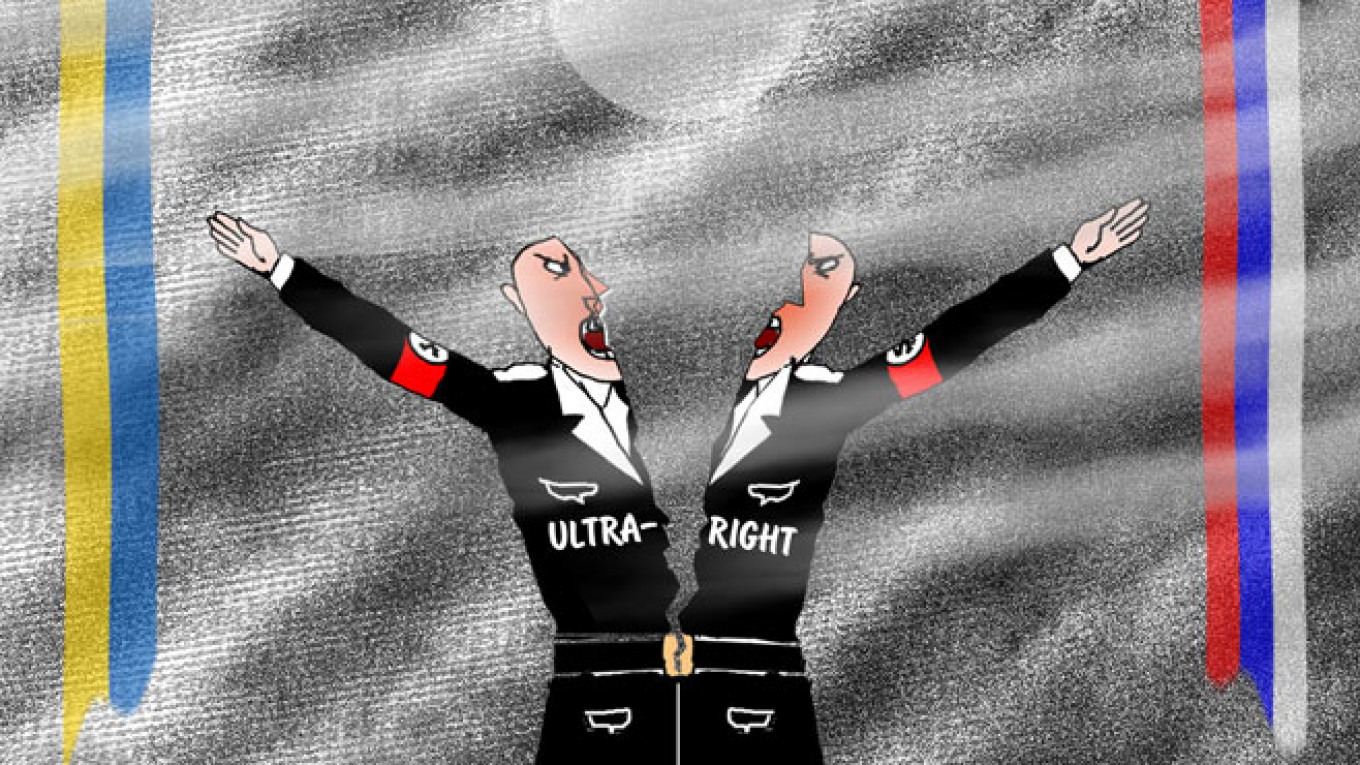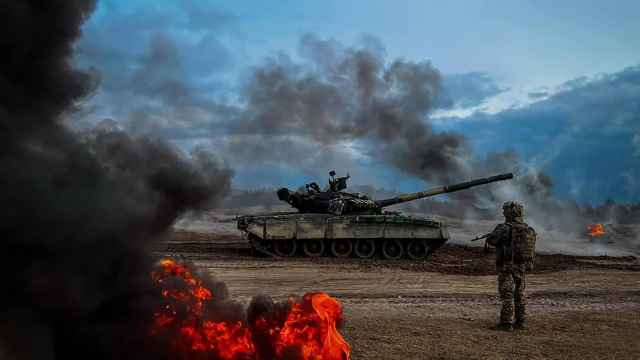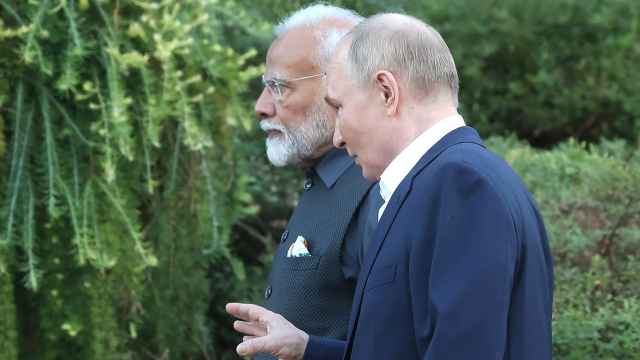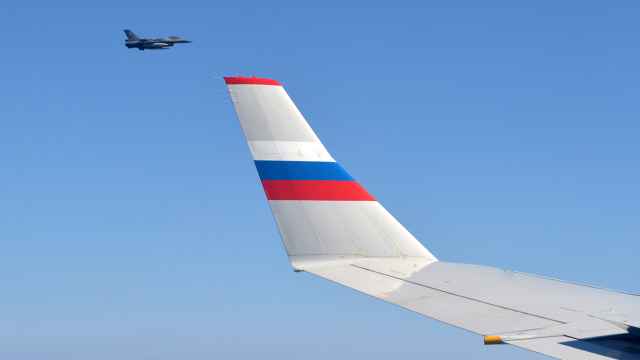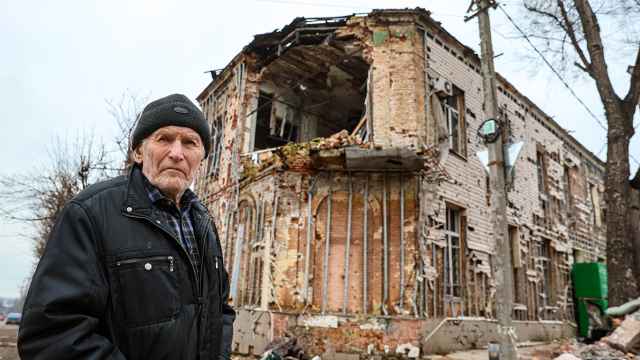Recent events in Ukraine have put Russian nationalists in a difficult position due to their lack of unity over the conflict. As a result, their ranks have undergone a further division and an unexpected reshuffling of alliances.
The leaders of publicly active organizations have been the most outspoken. As expected, most nationalist organizations approve of the annexation of Crimea and the so-called "Russian Spring." It is amusing to see how the rhetoric of such politicians and commentators as Eduard Limonov of The Other Russia and Yegor Prosvirnin of the Sputnik i Pogrom website have moved closer to the official line disseminated by state-controlled media.
The idea of a "Russian Spring" finds support from such disparate figures as opposition member Konstantin Krylov of the National Democratic Party, ultra-Kremlin-loyalist Alexei Zhuravlyov of the Rodina Party, militant nationalist and Stalinist Vladimir Kvachkov, card-carrying Nazi Dmitry Bobrov and others. They all view the conflict in Ukraine as a battle that pits ethnic Russians against ethnic Ukrainians and the West. Thus, even groups that view the Moscow regime as anti-Russian support "our own people" in the Donbass in eastern Ukraine.
Not surprisingly, few of these groups oppose the "Russian Spring." They include the majority of leaders among the Russians organization as well as their allies, men such as Dmitry Demushkin, Alexander Belov, Dmitry Yevtushenko of St. Petersburg and others. Ironically, their statements closely resemble those made by their sworn enemies in the liberal opposition.
These nationalists contend that both the Russians and Ukrainians in Ukraine would do better to live under the hated authorities in Kiev than under what they see as President Vladimir Putin's "anti-Russian regime."
However, the majority of Russian nationalists are autonomous militants that do not belong to any formal political organizations, and who are also in disagreement over Ukraine. In addition to the two positions mentioned above, some of these militants take a third view — that the conflict in Ukraine is a Zionist conspiracy against the Slavs. The result is that some see Novorossia as a region battling the Kiev oligarchy, while others dislike the "Soviet-minded dupes" of eastern Ukraine and most likely support Kiev in the war.
They oppose the idea of annexing eastern Ukraine because it would only add to the ranks of what they call "the mindless followers" of Putin's regime. Some of these autonomous nationalists also hold that Russia has primarily sent Chechens to fight on the side of the separatist "dupes" in hopes that many of them would never come home again.
Many of these groups and individuals are dissatisfied with the current political debate. Some nationalist organizations provide "humanitarian aid" to the separatists that, beyond food, cigarettes and clothing include military equipment and weapons. In fact, a variety of groups are now sending such "aid packages" and some nationalists collaborate in these efforts with official structures, such as Shield of Moscow leader Alexei Khudyakov.
The most active have already left for Ukraine to take part in the fighting. Rough estimates put the number of nationalists fighting in Novorossia at 200, but it is possible there are far more.
Most of those going to Ukraine are members of relatively organized groups such as the neo-Nazi Russian National Unity, or RNU, headed by Alexander Barkashov; the Eurasian Youth Union inspired by Alexander Dugin; the Russian Imperial Movement, or R.I.M., of Stanislav Vorobyov and so on, many of which first joined the struggle in Kharkiv and Odessa before linking up with forces in eastern Ukraine. Individual members of other groups that do not support the "Russian Spring" have also joined the fighting.
Nationalists from St. Petersburg are also actively fighting in Ukraine. Meanwhile, the Sputnik i Pogrom online media and Russian football-related websites have made public appeals for people to join the fighting.
Of course, The Other Russia party had to also get involved in the war and some of its members have already fought on the front lines in Ukraine.
Some nationalists have only loose affiliations with organized groups. They include Anton Rayevsky, who gained notoriety for posting a picture of his swastika-tattooed chest on the Internet and later falling out of favor for his exploits in Odessa. He recently posted an online appeal for funds with which he purchased ammunition and went off to fight in Ukraine.
The majority of Russian nationalists fighting in Ukraine are motivated more by ideological conviction than party affiliation. And they include veterans of wars in Chechnya and even Afghanistan as well as retired soldiers. That means not only are young Russian Nazis carrying guns, but also well-trained and experienced adult soldiers. Many of them either are or have been associated with RNU and Cossack groups that have traditionally been most active in regions close to the Ukrainian border and that have given military training to thousands of young men over the years.
However, it would be a mistake to exaggerate the importance of these organizations. For example, the fact that a photo showing 30 armed men standing before the RNU flag circulated widely on the Internet does not mean they all belong to the organization or that they, and others linked to them, necessarily went off to fight in Ukraine.
Even less information exists about the significantly smaller number of Russian nationalists fighting for the other side in this war. Roman (Zukhel) Zheleznov, an associate of recently convicted Maxim (Tesak) Martsinkevich, arrived in Kiev in July with plans to receive Ukrainian citizenship and head up the Russian Nazis fighting in the Azov battalion — although the number of soldiers in that group remains unknown. His choice of battalions is no accident: the neo-Nazi Social National Assembly forms the backbone of the Azov unit.
Zheleznov associate Mikhail Oreshnikov also hurried to Ukraine and became a member of one of several existing groups that span both sides of the border. Dozens of members of the group, the Misanthropic Division, took part in clashes in Kharkiv and other cities before more recently joining the Azov battalion.
Some ultra right-wing Russians have already died fighting on the front lines of the war in Ukraine. They include Sergei Yefremov, Alexander Proselkov, Sergei Vorobyov, Nikolai Leonov and Ilya Guryev — representing a range of nationalist and Cossack groups. On the other side of the lines, Azov battalion member Sergei (Balagan) Grek died in fighting near Donetsk.
Thus, a significant number of right-wing Russian radicals are now actively fighting in Ukraine. Whereas they previously took part in social networks, historic war battle reenactment groups and all sorts of quasi-military training camps, they are now gaining real-world combat experience.
Following the conclusion of the conflict, most will inevitably return to Russia, where their long-standing dreams of staging a "Russian revolt" or "white revolution" will no longer seem so difficult an accomplishment. And that means that one more consequence of this war will be a sharp escalation of activity by right-wing radicals — only this time, in Russia itself.
Natalia Yudina is an expert on hate crime at the SOVA Center for Information and Analysis think tank.
A Message from The Moscow Times:
Dear readers,
We are facing unprecedented challenges. Russia's Prosecutor General's Office has designated The Moscow Times as an "undesirable" organization, criminalizing our work and putting our staff at risk of prosecution. This follows our earlier unjust labeling as a "foreign agent."
These actions are direct attempts to silence independent journalism in Russia. The authorities claim our work "discredits the decisions of the Russian leadership." We see things differently: we strive to provide accurate, unbiased reporting on Russia.
We, the journalists of The Moscow Times, refuse to be silenced. But to continue our work, we need your help.
Your support, no matter how small, makes a world of difference. If you can, please support us monthly starting from just $2. It's quick to set up, and every contribution makes a significant impact.
By supporting The Moscow Times, you're defending open, independent journalism in the face of repression. Thank you for standing with us.
Remind me later.


